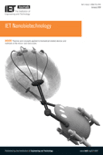
IET Nanobiotechnology
metrics 2024
Innovating at the Intersection of Nanotech and Biology.
Introduction
IET Nanobiotechnology, published by WILEY-HINDAWI in the United Kingdom, is a leading journal dedicated to advancing the field of nanobiotechnology by exploring the interplay between nanotechnology and biological systems. With an impressive impact factor and a significant coverage in Scopus rankings, this journal occupies a pivotal position within the Q2 and Q3 quartiles across various relevant disciplines, including Biotechnology, Electrical and Electronic Engineering, and Nanoscience. Since its inception in 2007, the journal has showcased a diverse range of high-quality research that facilitates the development of innovative nanomaterials and their applications in medicine, biosensing, and bioengineering. Open access to its articles ensures that cutting-edge advancements are readily accessible to the global research community, fostering collaboration and knowledge sharing. As the field of nanobiotechnology continues to evolve, IET Nanobiotechnology remains a crucial resource for researchers, professionals, and students striving to shape the future of this interdisciplinary domain.
Metrics 2024
 0.51
0.51 3.80
3.80 2.90
2.90 54
54Metrics History
Rank 2024
Scopus
IF (Web Of Science)
JCI (Web Of Science)
Quartile History
Similar Journals
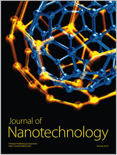
Journal of Nanotechnology
Connecting Ideas, Advancing NanotechnologyThe Journal of Nanotechnology, published by Hindawi Ltd., is a premier open-access platform dedicated to delivering high-quality research in the dynamic field of nanotechnology. With the ISSN 1687-9503 and E-ISSN 1687-9511, this journal has been at the forefront of disseminating innovative findings since its transition to open access in 2009, fostering a global dialogue among researchers, professionals, and students. Based in Egypt, the journal maintains its commitment to advancing the material science sector, currently holding a prestigious Q2 ranking in the 2023 Materials Science (miscellaneous) category, reflecting its significant contribution to the field. With a Scopus ranking of #162 out of 463 journals in General Materials Science, placing it in the 65th percentile, the Journal of Nanotechnology serves as a crucial resource for those looking to explore the latest advancements and applications in nanomaterials. The journal invites submissions that align with its scope, which emphasizes interdisciplinary approaches and novel methodologies, promising to enhance both academic and practical aspects of nanotechnology.
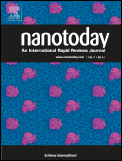
Nano Today
Connecting scholars to the latest breakthroughs in nanotechnology.Nano Today is a prestigious journal published by ELSEVIER SCI LTD that stands at the forefront of nanoscience and nanotechnology research. With an impact factor that underscores its significance, this journal has achieved remarkable rankings in several key categories as of 2023, including Q1 positions in Bioengineering, Biomedical Engineering, Biotechnology, Materials Science, and Pharmaceutical Science, making it an essential resource for scholars and professionals alike. ISSN 1748-0132 and E-ISSN 1878-044X, the journal serves as a vital platform for disseminating cutting-edge research findings and innovative applications in the field. Although open access options are not available, the journal's rich repository of peer-reviewed articles provides invaluable insights into the latest advancements in nanotechnologies. Based in the Netherlands, Nano Today not only connects a global network of researchers but also propels forward the conversation on the transformative potential of nanomaterials across multiple disciplines. With a commitment to advancing knowledge and fostering innovation, Nano Today is an indispensable tool for academics and practitioners dedicated to pushing the boundaries of scientific exploration.

Biomaterials Research
Innovating the future of biomedical engineering.Biomaterials Research, published by the American Association for the Advancement of Science, is a prominent open access journal established in 2014, dedicated to advancing the field of biomaterials. Based in the United Kingdom, this journal has swiftly become an essential platform for researchers and practitioners, offering groundbreaking insights in biomaterials, biomedical engineering, ceramics and composites, and miscellaneous medical fields. With its impressive Q1 ranking across multiple relevant categories in 2023 and its strong Scopus rankings, including a remarkable 90th percentile in the medicine category, Biomaterials Research showcases high-quality, peer-reviewed research designed to address both practical and theoretical challenges in biomaterials science. As an open access journal, it promotes wider dissemination and accessibility of research findings, crucial for fostering innovation and collaboration within the scientific community. Researchers, professionals, and students alike are encouraged to contribute, read, and engage with the latest developments in this dynamic field.

Carbohydrate Polymer Technologies and Applications
Innovative Insights into Carbohydrate Polymer TechnologiesCarbohydrate Polymer Technologies and Applications, published by ELSEVIER, is an esteemed open access journal that has been fostering innovation in the field of carbohydrate polymer research since its inception in 2020. With its ISSN 2666-8939, this journal is dedicated to exploring the intersections of analytical chemistry, biochemistry, biotechnology, and materials science, making significant contributions to our understanding of carbohydrate polymers and their diverse applications across various industries. Notably, it has attained a prominent position in various categories, reflecting its quality and impact: ranked Q1 in Analytical Chemistry, Biotechnology, and several Materials Science disciplines, while maintaining strong positions in the Q2 and other quartiles. Additionally, with impressive Scopus rankings—14th in Chemistry (miscellaneous) and 23rd in Analytical Chemistry—it stands at the forefront of scholarly dialogue in these areas, appealing to researchers, professionals, and students alike. The journal's commitment to open access facilitates wider dissemination of knowledge and enhances collaborative research, solidifying its role as a pivotal resource for advancing carbohydrate polymer technologies.

International Journal of Nano Dimension
Unveiling the potential of nanomaterials in science and engineering.The International Journal of Nano Dimension is a premier publication dedicated to advancing the field of nanotechnology and its applications across various disciplines, published by the Islamic Azad University, Tonekabon Branch. With an ISSN of 2008-8868 and an E-ISSN of 2228-5059, this journal serves as a vital platform for researchers, professionals, and students seeking to disseminate and access cutting-edge findings in nano materials and their integration into science and engineering. The journal has gained notable recognition in Scopus rankings, especially within the fields of Materials Science and Chemical Engineering, emphasizing its commitment to high-quality research. Spanning the years from 2019 to 2024, the journal emphasizes open access to foster knowledge sharing in the scientific community. As nanotechnology continues to revolutionize industries, the International Journal of Nano Dimension plays an essential role in showcasing transformative research that addresses the challenges and opportunities of this dynamic field.
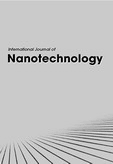
International Journal of Nanotechnology
Advancing the Frontiers of Nanotechnology ResearchInternational Journal of Nanotechnology, published by INDERSCIENCE ENTERPRISES LTD, is a prominent academic platform dedicated to advancing research in the rapidly evolving field of nanotechnology. With an ISSN of 1475-7435 and an E-ISSN of 1741-8151, this journal has been contributing valuable insights and innovative findings since its inception in 2004. Although currently not an open-access publication, it serves as an essential resource for researchers, professionals, and students alike, encompassing critical areas such as bioengineering, condensed matter physics, and materials science. The journal is indexed in Scopus, highlighting its academic rigor, albeit ranking in the lower quartiles across several categories. As it progresses towards its 2024 milestone, the International Journal of Nanotechnology continues to play a crucial role in fostering collaborative scientific discourse and pushing the boundaries of knowledge in nanoscience. With a distinguished reputation in the United Kingdom and beyond, it is a vital tool for anyone looking to stay at the forefront of nanotechnology advancements.
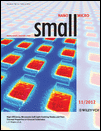
Small
Pioneering Discoveries in Biomaterials and Beyond.Small is a premier academic journal published by WILEY-V C H Verlag GmbH, focusing on cutting-edge research across a multitude of disciplines including biomaterials, biotechnology, chemistry, engineering, materials science, medicine, and nanoscience. With an impressive impact factor and recognized in the top quartile (Q1) across these categories, Small serves as a vital platform for scientists and researchers aiming to disseminate innovative findings and explore the interplay between small-scale materials and their large-scale applications. Enjoying a broad readership, the journal has been key in advancing knowledge from its inception in 2005 and aims to foster collaborations and discussions that steer the future of material science and biotechnology. Though not open access, research published in Small remains invaluable for professionals and students eager to explore the advancements at the nanoscale, promoting a comprehensive understanding of modern scientific challenges and opportunities.

Nanomedicine Journal
Exploring the Frontiers of Nanotechnology in Healthcare.Nanomedicine Journal, published by Mashhad University of Medical Sciences, serves as a vital platform for research and developments in the dynamic field of nanotechnology applied to medicine. With an ISSN of 2322-3049 and an E-ISSN of 2322-5904, this Open Access journal, operational since 2013, makes cutting-edge research freely accessible to encourage collaborative efforts in this rapidly evolving domain. The journal navigates various areas, including bioengineering, biomedical engineering, materials science, and pharmacology, holding prestigious rankings in categories relevant to these fields. The 2023 Scopus Rankings reveal its significant standing within the scientific community, particularly with a 76th percentile in general medicine. By bridging the gap between laboratory technologies and clinical applications, the Nanomedicine Journal aims to empower researchers, professionals, and students alike to contribute to the innovative landscape of nanomedicine. With a convergence period extending from 2019 to 2024 and an established reputation, this journal is essential for those pursuing advancements in therapeutic solutions and diagnostics through nanotechnology.

BME Frontiers
Innovating at the Intersection of Science and MedicineBME Frontiers, published by the American Association for the Advancement of Science, is an innovative open-access journal dedicated to the burgeoning field of Biomedical Engineering. Since its establishment in 2020, this journal has aimed to bridge the gap between cutting-edge research and practical application, promoting advancements in biomedical technologies, medical devices, and healthcare solutions. Boasting impressive rankings within Scopus—64th among 398 in Medicine (miscellaneous) and 81st among 303 in Biomedical Engineering—BME Frontiers stands out as a significant contributor to scholarly communication, offering rich insights for researchers, professionals, and students alike. With consistent publication projected through 2024, the journal serves as an essential platform for disseminating high-quality research that can drive innovation and inspire new approaches in the healthcare sector.
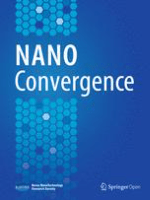
Nano Convergence
Pioneering interdisciplinary research for a nano-powered future.Nano Convergence is a premier open access journal dedicated to the rapidly evolving fields of nanotechnology, materials science, and engineering. Published by SPRINGER, this journal has been at the forefront of interdisciplinary research since its inception in 2014, and is set to continue its journey until 2024. With an impressive impact factor and recognition as Q1 in both Engineering (miscellaneous) and Materials Science (miscellaneous) categories, Nano Convergence ranks among the top publications, listed as Rank #8 out of 307 in General Engineering and Rank #34 out of 463 in General Materials Science according to Scopus metrics. This journal provides a platform for researchers, professionals, and students to share pioneering studies that converge different disciplines within nanotechnology. With its commitment to open access, Nano Convergence ensures that cutting-edge research is readily available to the global community, fostering innovation and collaborative advancements in the field.